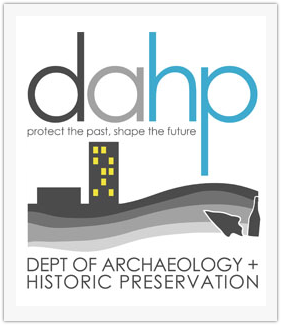House Bill 1386 Preservation Fund
In 2005, the Washington State Legislature passed House Bill 1386, which increased the local document recording fee from $2 to $5. The fee is collected by each county auditor, who by law must record and file deeds and certain other documents related to real estate transactions. Every time a document is recorded a $5 recording fee is collected. One dollar of the fee be placed in the county general fund and is to be used by the county commission for document preservation and/or historical programming or preservation in the county. The enabling cob is RCW 36.22.170.
The HB 1386 money is of significant interest to the heritage community of each county. It offers a means for museums and heritage organizations to obtain funding for programming and promotion, both ongoing needs at museums statewide. The amount of the fund varies by county and depends on the number of documents recorded during the year. The more documents recorded in a county, the bigger the fund will be.
Many counties have created mechanisms by which these funds are distributed. Variously titled as historic or heritage grants, they are administered in different ways.
In Pierce County the Historic Preservation Commission oversees the funding and provides detailed guidelines for funding historic preservation projects, with other history project as eligible for funding with far fewer requirements. In Thurston County, the Historic Commission, a citizens group appointed by the County Commissioners, selects heritage projects of $5000 and less for funding.
Examples:
Clark County: In 2006, the county commission created the Historical Promotion Grants Program “to promote historical preservation and historical programs and education,” awarding more than $140,000 in grants for six projects ranging from museum exhibits, to collections acquisition, to downtown historic preservation. Since that time amounts granted have ranged from a low of $60,000.00 to a high of $78,586.00, 2011 and 2014 respectively. The 2014 amount reflects budgeting for seven projects.
Benton County: Since 2009, various grants have been awarded to numerous organizations including facade grants, walking and bicycle tours as well as oral history projects. Grants have ranged from a little over $1,000 to over $22,000 and are awarded each year through a competitive grant process.
King County: The state’s biggest county also earns the most from the document recording fee. The county budget stipulates that funds raised through the recording fee not be used to supplant existing funding sources; the auditor determined that the allocation and expenditure of revenues earned by the surcharge, “to ensure that those revenues are used to support historic preservation and heritage programs consistent with the intent of [the legislation]. The funding and support for historic preservation and heritage programs prior to the enactment of House Bill 1386, to ensure that the filing fee surcharge is used to complement rather than replace existing resources dedicated to those programs.”
Thurston County: In 2006, the county collected $180,000 and dedicated is entirely to a historical document digitization and indexing initiative. The digitization phase, was completed that year, includes more than a million documents dating from 1852 to the present. As of 2014, $29,000.00 was awarded in increments of $5000 or less.
Pierce County: The county collected $300,000 in 2006 and used it for historic document preservation through the Imaging System Fund, which contains major allocations to preserve the oldest records in the Auditor’s Office, image the “property cards” and other documents in the Assessor’s office, and provide funding for an electronic document management system in the Assessor-Treasurer’s office. Currently there is a Historic Preservation Grant Program that funds: Stabilization, restoration, or rehabilitation of buildings or structures listed or are in the process of being listed in a local historic register; preservation or enhancement of photographs, documents, and or other materials in Pierce County museums historical societies, and libraries; historic markers to promote county heritage; Pierce County history research; public events and public programs that promote public awareness of history and/or the cultural heritage of a community within Pierce County at large. Grants for a maximum of $7500.00 are available.
Spokane County: Anticipated revenues of $381,000 in 2007. Half applied to document preservation; other half not known how applied. At this time, one organization per year receives funding up to $7500.00 for historic preservation activities.
Snohomish County: is currently accepting applications from public and nonprofit agencies for projects that develop and promote heritage preservation in the county. By providing matching funds on a competitive basis, the Community Heritage Program supports projects that promote the public’s access to county history. Funding is available for professional development, public education and programs, capital improvements or collections management.
So where is each county’s money?
Revenue is collected by the county auditor and should appear as a separate revenue stream in that budget. Expenditures should be in the county general fund, but may not be listed separately or in a way that is easy to locate. Search your county budget (many of them are online).
If you cannot find the funds, ask the county budget office to track them down for you. Be aware that many counties won’t know what you’re talking about, so it’s important to be very specific and detailed in your questioning. In Thurston County, for example, the revenues are listed under the Auditor’s Office in the maintenance and operation fund. But, there is one line for “Auditor Document Preservation Surcharge” and another line for “Document Preservation.” And in many counties, the document preservation charges are lumped together under “document preservation” or even something like “miscellaneous fees and charges.” It will take persistence and knowledge to get the answers you seek.
Once you locate the revenues, analyze how they are being expended—or whether a specific program exists to guide their use. The intent of the legislation was to provide funds for heritage organizations.
It is incumbent on each county’s heritage and historic preservation groups to communicate among themselves and then with county officials who allocate and administer these funds. Write letters to the County Auditor and County Budget Office to determine the recent balance in the revenue collections and what plans are in place for dispersing the funds collected under the Preservation Funds from House Bill 1386.




